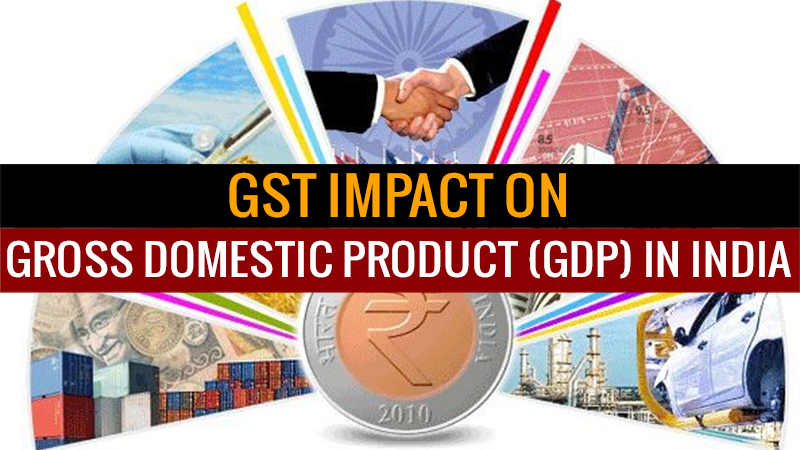
The biggest tax reform i.e. Goods and Services Tax is now a part of Indian Economy. A new and unified tax structure is followed for indirect taxation on the place of various tax laws like Excise duty, Service Tax, VAT, CST etc. and for sure the new tax regime is determined to eliminate the cascading effect of tax on transaction of products and services, and it will result in availability of product and services to consumers at lower price.
Recently, India accounted 5 percent growth for the Q1 of FY 2019-20, and it is now lower than China’s GDP growth rate of 6.2 percent for the same period.
Latest Update on GDP Data for FY 2019-20 1st Quarter (April to June 2019)
As per the recent data by CRISIL, the Indian economy may not see a rise over above 6.3% for the fiscal year 2020. The current data have opposed the previous suggestion of 6.9% GDP for the year.
The news is in the air due to the disclosure of the lowest 5% GDP of the country in recent years. As per the statement by crisil, “We expect growth to get some lift from the low base effect of 6.3 per cent in the second half of the FY19.”
There is a lowered 0.6% of GDP for the given financial years due to slowdown in the overall economy and revelation by the economics department responsible for foir the maintenance of the financial health of India.
GDP Data for FY 2018-19 Last Quarter (January to March 2019)
India’s GDP has been recorded at 7.7 percent in the quarter of January – March, with a fast approach towards better number than 7.0 in the previous quarter. With some expectations for 6.7 percent in the financial year 2018, to the 7.3 percent and 7.5 percent in the FY 19 and FY 20 respectively. There is some hindrance to the GDP number due to GST as speculated by the experts but still, many economists are likely to maintain around 6.5 percent.
So here in this article, we will see the GST impact on the Indian Economy.
Read Also: GST Impact on E-commerce Sector in India
GST Positive Impact of GDP
Now, There is only one tax rate for all which will create a unified market in terms of tax implementation and the transaction of goods and services will be seamless across the states.
The same will reduce the cost of the transaction. In a survey, it was found that 10-11 types of taxes levied on the road transport businesses. So the GST will be helpful to reduce transportation cost by eliminating other taxes.
After GST implementation the export of goods and services will become competitive because of nill effect of cascading effect of taxes on goods and products. In a research done by NCAER, it was suggested that GST would be the key revolution in Indian Economy and it could increase the GDP by 1.0 to 3.0 percent.
GST is more transparent in comparison to the previous law provision so it will generate more revenue to the Government and will be more effective in reducing corruption at the same time. Overall GST will improve the tax Compliances.
In a report issued by the Finance Ministry, it was mentioned that Make In India programme will be more benefited by the GST structure due to the availability of input tax credit on capital goods.
As the GST will subsume all other taxes, the exemption available for manufacturers in regards of excise duty will be taken off which will be an addition to Government revenue and it could result in an increase in GDP.
The GST regime has although a very powerful impact on many things including the GDP also. The Gross Domestic Product has the tendency to loom on the shoulders of revenue generated by the economy in a year. Still, a worthwhile point includes that the GST has the capability to extend the GDP by a total of 2 percent in order to complete the ultimate goal of increasing the per-capita income of every individual. Also, the GST scheme will certainly improve the indirect revenues to the government as the tax compliance will be further enhanced and rigid, extending the tax paying base which will add to the revenue. The increased income of the government will redirect towards the developmental projects and urban financing creating an overall implied scenario.
GST Negative Impact on GDP
In a report, DBS bank noted that initially, GST will lead to the rise in inflation rate which will remain for a year but after that GST will affect positively on the economy.
As we know Real Estate also plays an important role in Indian economy but some expert thinks that GST will impact the Real Estate business negatively as it will add up the additional 8 to 10 percent to the cost and reduce the demand about 12 percent.
GST is applied in the form of IGST, CGST AND SGST on the Center and State Government, but some economists say that there is nothing new in the form of GST although these are the new names of Central Excise, VAT, CST and Service Tax etc.
As every coin has two faces in the same way we tried here to familiarize the things related to GST with both perspective i.e. positively and negatively in this article. Despite having some factor which is being expected to affect the Economy adversely there are so many other things which are expected with a positive impact on GDP.
